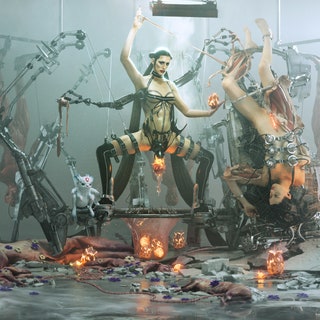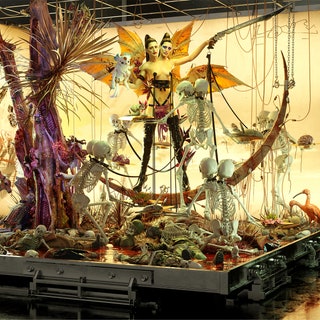Arca’s ambitious musical cycle concludes with four albums spanning reggaeton, club experiments, and tender synth lullabies. It’s a slippery, unwieldy, mind-bending collection of sound design that drives home the ur-theme of all her music: transformation.
Arca’s music refuses to be contained. From the very beginning, it has thrived on its intractability. Her first two EPs, 2012’s Stretch 1 and Stretch 2, oozed beyond category, harbingers of an elasticity then creeping into the fringes of electronic music. The Venezuelan-born electronic musician was equally cavalier about format: On the 2013 mixtape &&&&& and 2016’s Entrañas, she strung together bewildering assemblages of rhythms and textures into maze-like 25-minute suites; on 2020’s @@@@@, she mapped an even more labyrinthine path through a single-track collage more than an hour long. Later that year, she used an AI to generate 100 versions of her song “Riquiquí.”
She has swung from amoebic abstractions to spleen-crushing club experiments and from tender arias to Kevlar-coated reggaeton, sometimes in the course of a single album. She speaks of her work in terms of quantum states; a proudly nonbinary trans woman, she celebrates her own multiplicity, and as an artist, she revels in the right not to have to choose. It’s right there in the title of &&&&&: andandandandand—not this or that but everything all at once. Four new albums, released across four consecutive days in late November and early December—KICK ii, KicK iii, kick iiii, revealed in a staggered series of announcements over the past couple of months, followed by the surprise kiCK iiiii—offer a sprawling, multidimensional picture of that everythingness.
Last year’s KiCk i heralded a new phase in the Barcelona-based musician’s career. Arca was no stranger to pop music’s periphery, having collaborated early on with Kanye, FKA twigs, and Björk, but KiCk i felt like the first major step toward reinvention as a pop star in her own right. The sound design was cleaner and more pristine; in place of the airy falsetto of 2017’s Arca, her vocals shouldered to the front of the mix, particularly on club-centric songs like “Nonbinary,” “Mequetrefe,” and the Rosalía collaboration “KLK.” Though her rhythms shuddered as violently as ever, they focused more narrowly on reggaeton and trap-influenced grooves. There was no shortage of variety, but it felt as if she had tamed some of the chaos, gotten used to saying “or” instead of “and.” Volumes two through five complicate the picture once again. Their 47 songs testify to Arca’s giddy penchant for excess, and the way the four volumes tangle together reinforce the idea that she is uninterested in following any path for long—even one of her own design.
Outwardly, each volume has its own character, and although those distinctions tend to blur as you go deeper into each disc, KICK ii is generally identifiable as the reggaeton album. Following an eerie, abstract intro in the form of “Doña,” a witchy invocation set to skittering FX, the first three proper songs delve into crisp, clipped percussion arrayed into loping dembow rhythms. All three feel like clear extensions of KiCK i’s “Mequetrefe” and “KLK,” but they also stand on their own: Swimming with plangent synth melodies that recall ’90s trance, they move with an aquaticism that contrasts with Arca’s fiery vocal takes. Variously shouting out Prada heels, her beloved “transformistas,” and the “gringos” and “güeros” throwing bills in the air, Arca cuts a larger-than-life figure bestowed with a voracious desire. (Fellow Barcelona-based Venezuelan expat Cardopusher co-produced all three; Boys Noize also contributed to “Tiro.”) In “Rakata,” she comes off as a metaphysical poet of horny-on-main: “Que me como al mundo ya/Con estas ganas de follar ya” (“I could devour the world now/With this urge to fuck”). It’s worth noting just how funny she can be; repeating the syllable “ya,” she adopts a sing-song tone that bounces like a slow-motion yo-yo. In “Tiro,” she commands listeners’ attention in clipped, staccato tones—“Tacones negros, falda beige/Labios rojos, mira, mírame” (“Black heels, beige dress/Red lips, look, look at me”)—in between reeling off Venezuelan place names, as though she could upend North/South geopolitics by the sheer force of her sexual magnetism.
They’re among the fiercest songs in Arca’s catalog to date. “Luna Llena” and “Lethargy” are slower and sultrier, suffused in Harold Budd-esque piano and processed vocals; the beat of the latter consists of little more than plunging bass and samples of hissing breath. From there, KICK ii fragments into sketch-like mutations; after that initial trio of bangers, the abstract “Araña,” “Femme,” and “Muñecas” feel like three interstitials in a row. Still, the dizzying swirls of piano and voice on “Confianza,” another Cardopusher co-production, show that Arca doesn’t need more than a minute or two to make her mark; the song’s ambient finale might be the most satisfying 30 seconds of music in the whole set, and would have made a fantastic finale to KICK ii. Instead, she follows with “Born Yesterday,” a Sia collab whose belted vocal feels better suited to an EDM topline circa 2011. The shift midway through from glitch beats to turbocharged four-on-the-floor is the rare case where Arca’s maximalist instincts miss the mark.
Where KiCK ii is the (mostly) reggaeton disc, KicK iii is dedicated to experimental club beats influenced by the IDM of Arca’s youth. Pairing the risk-taking instinct of her best music with the swaggering confidence she projects as a kind of cyborg diva, it is the best of all five albums in the set, and one of her strongest full-lengths to date. She comes charging out of the gate on “Bruja,” a bluntly percussive ballroom anthem featuring some of her most audacious lyrics (“Hissy fit throw it up bitch bounce back/Get it wet, pull it, rip it, stroke, tranny cumming hard, till my chochi pulses raw”). As on KICK ii’s most dramatic tracks, her flow—octaves cracking, Rs rolling—overflows with sass. But after the helium-voiced trap/breakbeat hybrid “Incendio,” things quickly turn thrillingly strange once again. “Morbo” rumbles like a bulldozer in a pachinko parlor; “Fiera,” strafed with erratic drum patterns, just barely avoids ripping itself apart, less a song than an avalanche. The chiming “Skullqueen” pays homage to drill’n’bass-era Aphex Twin; a few tracks later, the Max Tundra collaboration “Rubberneck” returns to the waterlogged piano that comprises one of the set’s throughlines, but the springy beat is pure UK bass.
The mind-bending sound design drives home the ur-theme of all Arca’s music: transformation. Synthesized sounds take on the dimensions of real-world objects; acoustic signals like piano or voice transmogrify into iridescent, wormlike shapes. “My 2,” KicK iii’s antepenultimate song, consists mostly of processed vocals that whiz like loosed balloons and bleat like melting kazoos. It’s a swarming, sludgy sound, like a beehive in a tarpit. But the collection’s sheer surfeit of ideas also makes it harder for standout moments like this to rise to the surface. The lurching “Intimate Flesh,” which follows, sounds like something we’ve heard from Arca many times before; its familiarity dulls the senses, which is a shame, because “Joya,” which closes out the set, is one of the best songs of the entire five-volume series. “Te quiero decir/Eres una joya entre los hombres/Siento tanto amor,” she sings in her most clarion falsetto. (“I want to tell you/You are a jewel among men/I feel so much love.”) A spiritual kin to Björk’s “Hyperballad,” it’s one of the most dulcet, heartfelt songs Arca has made, and it deserves more breathing room.
If confidence is the unifying thread of the swaggering KICK ii and KicK iii, tenderness comes to the fore on kick iiii, as Arca takes stock of the changes she has undergone and celebrates the self she has birthed. “Now there was no need to look back/Everything she had was right there inside of her/Beckoning to see,” she announces on kick iiii’s opener, “Whoresong,” her voice a Windex smear over rain-spattered piano. On “Witch,” No Bra’s Susanne Oberbeck croons through Auto-Tune about “merging multiple monsters” over glistening pools of piano. And on “Alien Inside,” Garbage’s Shirley Manson gives a dramatic spoken-word performance over a shoegaze rumble that sounds like Tim Hecker taking a sandblaster to M83. Citing “the first death” and “the last birth”—themes that recur across the album—Manson intones, “The first time you recognize the alien inside/In the face of abject misery/Remember posthuman celestial sparkle/A mutant faith.” “Mutant faith” is not a new concept in Arca’s work; she used the phrase as the title of an improvisational performance piece at New York’s The Shed in 2019. But here, it sounds less like an abstract concept than a supernatural force distilled into sound.
kick iiii contains some of the most contemplative songs in the series—like the Oliver Coates collaboration “Esuna,” a mournful swirl of strings and plaintive vocal harmonies—but the widescreen intensity of “Alien Inside” fuels two more of the set’s boldest songs. “Queer” is a regal, fist-in-the-air anthem set to a gargantuan gothic trap beat. “I got tears, but tears of fire,” Planningtorock sings over titanium synths and bear-trap drums: “Tears of power, tears of power/I got tears like a queer/Queer power.” A protest song in the plainest of terms, it’s one of a few tracks here that feel likely to become fan favorites, even rallying cries. The unequivocal nature of the song’s message combined with its innocent imagery and Yeezus-grade beat are refreshingly original. And on “Lost Woman Found,” Arca leans into her quantum states to sing a song of herself. The melody is soaring, almost melodramatic; the swirls of synth and white noise are forbiddingly dense. Yet her lyrics are as intimate and direct as she’s ever been. After years spent “walking towards the light,” she declares, “I finally have something to say:/You can find out on your own/What it means to be mutant/What it means to recognize the alien inside the abject.”
kiCK iiiii, released without advance notice the day after iiii, is the most understated of the five volumes. “Pu” is a lovely little synthesizer lullaby, like a music box from the future. “Estrogen” is a lyrical piece for harpsichord and reverb, “Ether” a pensive piano etude. The beatless ambient techno of “Amrep” wouldn’t sound out of place alongside early Oneohtrix Point Never. These songs don’t grab you by the lapels; they’re soft and sweet, expressions of intimacy and vulnerability that feel diametrically opposed to the over-the-top visual universe that Arca and Frederik Heyman have devised for the project, with its phantasmagorical dioramas full of two-headed skeletons and sphinx-like sculptures towering over the naked bodies of fallen men. Against the preceding volumes’ most attention-grabbing moments, they may risk getting lost in the shuffle, but perhaps that is part of their charm, too: The whole fifth volume feels like an Easter egg in a video game—a sparkly basket of jewels collected from the crevices of Arca’s more imposingly monumental works.
As Arca’s stature as a cult icon has grown—as her project has become simultaneously more personal and larger-than-life, towering on forbidding prosthetic stilts or colossal plinths—her music has become more idiosyncratic. Her pop collaborations, like the one with Sia, feel less distinctive than most of her work; the bulk of the new albums reflects a protective, hermetic energy, as though she were refocusing her efforts on her own evolution. She speaks of the Arca project in terms of world-building; on the new albums, it’s a world that grows inward, not outward. That can make approaching these four volumes, taken together, a daunting prospect: For all the songs’ evident variety, their repetition of familiar moods and core techniques causes much of the material to blur together.
But the excess is the point. For Arca, part of recognizing “the alien inside” is embracing all parts of herself—“merging multiple monsters” into an unsteady union. Just as KiCk i coincided with her public coming-out as transgender, these albums flesh out the continuing story of her becoming, in all its complexity. Perhaps the best way of approaching the five-volume series is as a single playlist with all 59 tracks on shuffle: a maze-like course obeying no logic but its own, a perpetual process of discovery. As she sings on “Whoresong,” realizing that “everything she had was right there inside of her” all along crystallized a new ability: “To encounter the unknown time and time again/A bloodlust for beauty.” Slippery and unwieldy and all the more fascinating because of it, this collection drips with that messy, scarlet-streaked desire.






0 comments:
Post a Comment